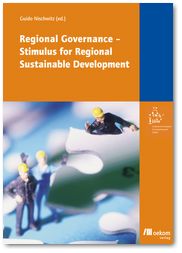Regional Governance. Stimulus for Regional Sustainable Development.
Dynamic changes in the economy, environment and society radically alter the conditions, competences and capacities for the political control of spatial development. Combined with the concept of sustainable development, these changes take place in a political and spatial multi-level system. Controlling instruments are modified and arranged in new ways, especially at the regional level. Therefore, the knowledge of the current developments within the political, economic, socio-cultural and ecological systems at the regional level is of vital importance.
Within the context of these developments, new forms of regulation have increasingly been linked with the notion of ‘governance’ in the socio-political debate. These new forms of regulation include serious challenges for nation states, enterprises and civil society and their interconnections.
This book gives a comprehensive survey of the current discussions about governance at the regional level, both from a very practical and a methodological point of view. The contributions range from problems of resolving regional conflicts and long-term regional planning to the interaction of regional development and the economic sector. It also offers an interesting methodological report on state-of-the-art multi-level governance.
With contributions of Michael Narodoslawsky, Dietrich Fürst, Timothy Moss, Helge Majer, Martin Tischer, Jobst Münderlein, Hannah Büttner and Thorsten Wiechmann.



